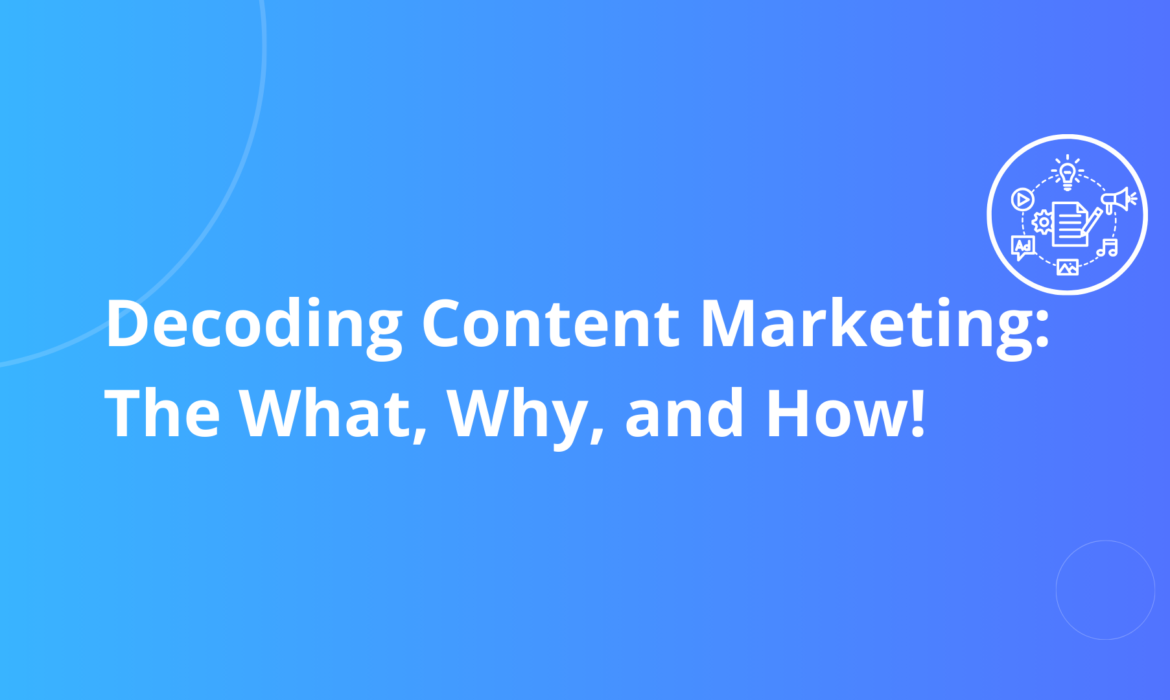
In today’s crowded digital landscape, where information is abundant, content marketing remains essential for B2B businesses to connect with their target audience, drive engagement, and achieve their sales and marketing objectives.
In this blog by Vanilla Skills, let’s start by understanding what content marketing really is, especially from the point of view of a B2B.
What is Content Marketing?
Content marketing is all about creating and sharing valuable, relevant content to attract and retain your target audience. In B2B, this means producing content that addresses the specific needs and challenges of your business clients. By offering insights, solutions, and expertise, you build trust and position yourself as a thought leader. This strategic approach not only helps your clients make informed decisions but also fosters stronger relationships and generates high-quality leads for your business.
What are some of the effective formats of content on social media platforms?
- Social media posts, primarily on LinkedIn for professional engagement
- Video content
- Blogs
- Infographics
- Case studies
- Newsletters
- Memes
- Webinars
Why Does Your B2B Need Content Marketing?
Content marketing offers numerous benefits and holds significant importance for B2B businesses across various industries:
- Increases Brand Awareness: By creating and distributing valuable content, your business can increase their visibility and reach among their target audience. Consistent content creation helps to establish brand recognition and familiarity.
- Drives Website Traffic: High-quality content attracts organic traffic to your website. By optimising content for search engines and promoting it through various channels, businesses can drive qualified traffic to their site, increasing the likelihood of conversions.
- Generates Leads: Content marketing serves as a powerful lead generation tool. By offering valuable resources such as eBooks, whitepapers, or webinars gated behind forms, businesses can capture leads and nurture them through the sales funnel.
- Improves Search Engine Rankings: Content marketing plays a crucial role in search engine optimization (SEO). By regularly publishing optimised content that targets relevant keywords, your B2B business can improve their search engine rankings and increase organic visibility.
- Cost-Effective Marketing Strategy: Compared to conventional advertising methods, content marketing is often more cost-effective. While it requires time and effort to create high-quality content, the long-term benefits in terms of lead generation, brand awareness, and customer engagement outweigh the initial investment.
- Supports Sales Efforts: Content marketing provides valuable resources that your sales teams can leverage to educate prospects and move them through the sales funnel. Sales enablement materials such as case studies, product guides, and comparison articles help to address buyer concerns and objections.
- Fosters Long-Term Growth: Content marketing offers long-term benefits by creating evergreen content that continues to attract leads and drive conversions over time. Consistently producing valuable content builds a sustainable growth engine for businesses’ marketing efforts.
How can you build an effective content marketing strategy?
Drawing from our Vanilla Skills’ expertise, here are 10 steps on how your B2B businesses can build a full-proof strategy!
- Understand Your Audience: Begin by thoroughly researching and understanding your target audience. Identify their pain points, challenges, interests, and preferences. This will guide your content creation efforts to ensure they resonate with your audience.
- Set Clear Objectives before Audience: As objectives change, audiences change. Define specific goals for your content marketing strategy. Whether it’s generating leads, increasing brand awareness, driving website traffic, or nurturing existing leads, having clear objectives will help you measure the success of your efforts.
- Develop a Content Strategy: Based on your audience research and objectives, develop a comprehensive content strategy. Determine the types of content you’ll create (e.g., blog posts, videos, eBooks, webinars), content themes/topics, frequency of publishing, and distribution channels.
- Create High-Quality Content: Produce content that provides value to your audience. Whether it’s educational, informative, entertaining, or inspirational, ensure that your content is well-researched, relevant, and engaging. Use a mix of formats to cater to different preferences and learning styles.
- Optimise for SEO: Incorporate relevant keywords and optimise your content for search engines to improve its visibility and reach. Focus on creating content that answers common questions or addresses common pain points within your industry to attract organic traffic.
- Promote Across Channels: This includes your website, social media platforms, email newsletters, industry forums, and third-party publications. Tailor your content promotion strategy to each channel for maximum effectiveness.
- Engage with Your Audience: Encourage interaction and engagement with your content by inviting comments, questions, and discussions. Respond promptly to comments and messages, and actively participate in conversations related to your content.
- Measure and Analyze Results: Regularly monitor the performance of your content marketing efforts using relevant metrics such as website traffic, engagement metrics (likes, shares, comments), lead generation, conversion rates, and ROI. Analyse this data to identify what’s working well and areas for improvement.
- Iterate and Improve: Use insights from your performance analysis to refine and optimise your content marketing strategy over time. Experiment with different content formats, topics, distribution channels, and promotion tactics to see what resonates best with your audience and drives the desired results.
- Stay Consistent and Persistent: Consistency is key to success in content marketing. Stay committed to your content strategy and maintain a regular publishing schedule. Building a loyal audience and seeing significant results from your efforts may take time, so be patient and persistent in your approach.
All in all , content marketing is a versatile and effective strategy that can help your B2B business to connect with your audience, establish authority, drive engagement, and ultimately, achieve marketing and sales objectives.
You can learn more about content marketing by connecting with us! We have an in-house team of experts who can help you and your B2B put the best content forward.
Talk to us at: contact@vanillaskills.com


